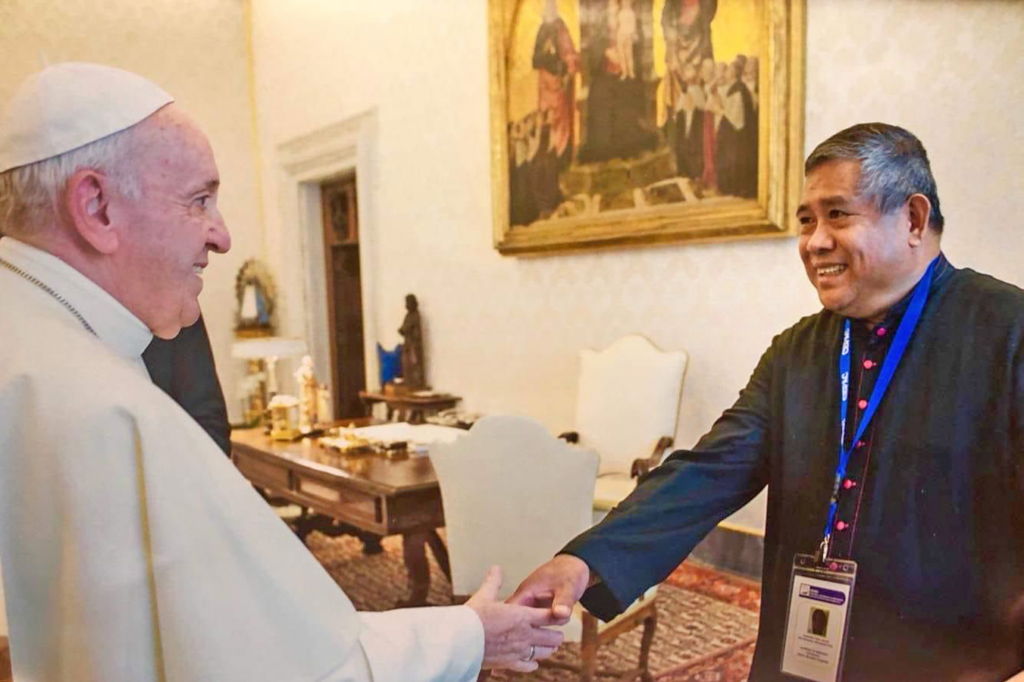Filipino priest appointed bishop in Cook Islands

Pope Francis appoints Reynaldo Bunyi Getalado (right) of the Mission Society of the Philippines as the new coadjutor bishop of the Rarotonga Diocese in the Cook Islands. Photo from Vatican Media
My thesis is plain and simple: Pope Francis truly believes what he said in 2018, that “the noble Church in the Philippines now stands among the great Catholic nations in the entire world,” that he trusts the Filipino leadership in the universal Church, and that this he validates by appointing more than a dozen Filipino bishops in overseas dioceses and as apostolic nuncios since he became the Supreme Pontiff.
Pope Francis assigned Filipino SVD prelate Joseph Tarife Durero in 2021 and Salesian Pedro Baquero in 2019 as resident bishops for Papua New Guinea (PNG), considered to be the world’s “last frontier.” Another Filipino, Rolando Santos, a Vincentian, has been a bishop in this country since 2011. To say that Filipino missionaries and sisters, appointed pastors of parishes or heads of mission outstations, are the most daring and courageous laborers in some of the most demanding places is an understatement. They are, but more than that, they are the living prophets of the gospel.
On December 8, 2023, on the Solemnity of the Immaculate Conception, Patroness of the Philippines, the Holy See made a surprise announcement: The appointment of REYNALDO BUNYI GETALADO of the Mission Society of the Philippines (MSP) as the new coadjutor bishop of the far-off Rarotonga Diocese in the Cook Islands.
Most Rev. Paul Patrick Donoghue, SM, just turned 75 in January this year, 75 being the mandatory retirement age for bishops. He is the sixth Catholic Bishop of Rarotonga in the Cook Islands, a place nearer to New Zealand and Australia than the Philippines. The distance between Manila and the Cook Islands is 9,500 km, and it takes approximately 22 hours to get from Manila to the Cook Islands by plane.
As part of the vast Polynesian region, the Cook Islands has one diocese, comprising 2,500 Catholics of the total population of 13,000 islanders. The Rarotongan Diocese is directly under the Dicastery of Evangelization, specifically the Section for First Evangelization and New Particular Churches, whose Pro-Prefect is Luis Antonio Cardinal Tagle.
I got to know Bishop-elect Rey in Waigani, PNG capital, some 30 years ago, when I was a visiting professor at the University of Papua New Guinea (PNG). His first assignment on the mission was located in a mountain parish. Due to the vastness of the mission territory where he worked, the only way to visit and celebrate the Mass among faraway scattered Christian communities was either by a day-long hike or by the use of a single propeller plane.
The one priest who learned to pilot a plane died in a plane crash. “Though I was young at that time,” he told me, “I was assigned to take on the priest’s duties in the mountain parish. When the PNG government undertook several projects, projects that consisted of two airstrips, a small edifice with two double classrooms, and four teacher’s houses.”
He revealed that, though inexperienced, he, being the leader of the place, was made in charge of projects. As in many underdeveloped places, the Catholic Church was made to assume both pastoral duties and big projects for social development, particularly education.
There he learned many wonderful things for God and the Church, Pro Deo et Ecclesia. He learned to carry loads of building materials using big trucks, while at the same time acquiring the skills to drive a bulldozer to push the ground and a tractor with a digger at the back—heavy equipment needed to construct an airstrip for small planes.
Finally, he told me that his episcopal ordination is scheduled for April 27, and his first Mass in his diocese in the Cook Islands will be on April 28. He received an official letter from the Vatican, and in that letter, Cardinal Tagle informed him that 1) the diocese has no formal structures and the task ahead is challenging; 2) the diocese is being served by four priests and 20 catechists; and 3) for 40 years, there has been no recruit of a new catechist.
Though at times we are afraid to move and venture into new possibilities, he told me that, with his new assignment, he’ll discern, listen more and work harder “to continue nurturing the seed of faith” among the faithful, praying that he, the bishop, and the “priests, religious sisters and the laity will journey together in harmony in the spirit of synodality.”
Bishop-elect Rey was ordained to the Holy Priesthood on August 4, 1988, and was assigned to the following: the Diocese of Daru-Kiunga in Papua New Guinea, where he served for 11 years; the Diocese of Auckland in New Zealand, where he served from 2000 to 2003; from 2003 to 2004, as parochial vicar of the Parish of Our Lady of the Abandoned in Mandaluyong City; between 2005 and 2014, he was assigned to the Diocese of Bougainville, an autonomous region in Papua New Guinea; and since 2014, he has been serving as the Ecclesiastical Superior of the Mission Sui Iuris of Funafuti in the Pacific.
Coming of age, “gifted to give,” the Filipino Church has assumed an awesome commitment to share with other nations the Faith we, the Filipino people, have so bountifully received.
As a great Catholic nation in Southeast Asia, Pope St. Paul VI once said, “You are truly ‘a city set on a mountain (which) cannot be hidden… A lamp put upon a lampstand, so as to give light to all’ (Matthew 5:15). Consider how great your responsibility is to give a good example to those of other faiths and thus sweetly draw men to the Heart of Jesus.”
Dr. José Mario Bautista Maximiano is the Lead Convenor of the Love Our Pope Movement (LOPM) and author of Church Reforms, Volumes 1 & 2 (Claretians, 2023 & 2024). You may contact him at jomaximiano@gmail.com.

